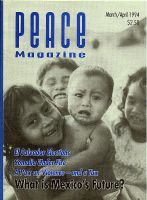
Peace Magazine Mar-Apr 1994, page 15. Some rights reserved.
Search for other articles by David Matas here
In no country can refugees feel confident of a fair reception. Everywhere there are local citizens who would block their acceptance, often for racist motives, sometimes for other reasons. For example, they try to reject the refugee claimant by arguing that conditions have improved in the countries from which they had fled. Those who wish to welcome the stranger must be prepared to combat the false optimism and rosy pictures they paint.
Claimants may be denied access to counsel, given no hearings, or not allowed to respond to objections before a decision is made. There may be no possibility of appealing a negative decision. Such unfair procedures lead real refugees to be rejected as false claimants.
Claimants may be detained in camps, or not allowed to work or go to school, or denied social assistance.
Sometimes admission to the country of destination is impossible without a visa granted abroad by the consulate of that government. Planes or ships may not transport the refugee claimants without proper documentation, yet no government will grant them visas. Refugees are forcibly returned to safe third countries if they have passed through them in transit to the country of destination. Some claimants are detained at airport zones; others are "interdicted"-- stopped on the high seas by agents of the country of their destination and prevented from arriving.
Refugee claimants who do manage to enter a country but whose claims are later rejected are not automatically returned to the country from which they fled. Many countries allow some rejected claimants to stay without refugee status, in a "B" status, which may be temporary and uncertain; the privileges may be overly restrictive.
Every year the U.N. attempts to place refugees. However, it can only identify a small portion of those in need of resettlement, and even fewer of these are, in fact, resettled. There are always too many.
It oversimplifies reality to call people either "refugees" or "voluntary migrants." Not every person who falls outside the refugee definition can be considered a voluntary migrant. For example, one may flee a war zone in order to avoid the random violence, yet not necessarily be deemed a refugee. If a whole group is to be defined as refugees, each member of it must be a potential target. This means that those fleeing from random violence in their homeland there-fore do not count as refugees, but they are certainly not voluntary migrants either.
Because of economic or environmental disasters, some individuals must move as a matter of survival. They too are neither refugees nor voluntary migrants. Besides, involuntary migrants who are not refugees need help as much as refugees do, though no international regime offers protection to them.
In many countries, voluntary migrants are allowed to come but not to become citizens. They become marginalized residents without a voice in the country. Residents should have rights to become nationals, but this would often require changes in citizenship laws.
Voluntary migrants are admitted on economic grounds when this seems likely to benefit the economy of the admitting country. Much depends on whether their arrival will lead to the loss of jobs by nationals, or whether migrants will go on welfare or be selfsufficient. Racists and bigots usually argue that the migrants will harm the economy. It is important-and usually possible-to show the contrary: that migrants benefit the economy.
Migration Within the Helsinki Space
Now that the iron curtain has been raised, the West has brought down a gold curtain around itself. When Eastern Europeans could not leave, they were welcome to the West as refugees. Now that they are free to leave, they cannot come because the West will not admit them. Europe remains divided by migration controls. The Helsinki process, generated by the Final Act of the Conference on Security and Cooperation in Europe signed in Helsinki in 1975, remains frustrated because freedom of movement within the Helsinki space is frustrated. We have to fight for a generous interpretation of the definition of refugee, for fair procedures, for accurate assessments of source country conditions, and for reasonable credibility assessment. We have to ensure that all governments admit their fair share of refugees. We have to promote family unity for migrants and refugees, and we must learn how to convince people that accepting refugees helps the domestic economy. We must support freedom of movement.
David Matas is co-chair of the Canadian Helsinki Watch group. He is a Winnipeg lawyer.

Peace Magazine Mar-Apr 1994, page 15. Some rights reserved.
Search for other articles by David Matas here